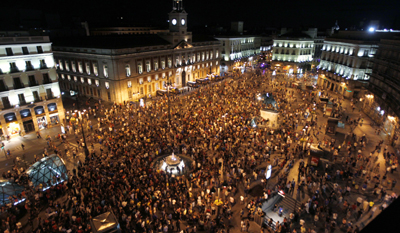Spanish press associations have expressed concern about recent episodes of police violence against journalists covering demonstrations against Pope Benedict’s four-day visit to Madrid and protests staged as part of the anti-corruption 15-M movement.
Freelance photographer Daniel Nuevo was covering August 18 protests in Madrid against the Catholic Church-sponsored World Youth Days, which featured Benedict XVI and attracted hundreds of thousands of pilgrims. Grassroots church groups and civic organizations organized the demonstrations to denounce the “waste” incurred by the celebration, which is partly financed by government and corporate sponsors.
“I was following a group of riot policemen down Atocha Street after the anti-pope demonstration was over on the night of August 18,” Nuevo told CPJ. He described the scene that led to him been beaten by an anti-riot unit of the national police. (Video footage is posted on YouTube.)
“There were both Catholic pilgrims and protesters walking in the area. Somebody yelled at the police, so they stopped walking and created a barrier in the street, blocking the traffic, to filter those who could walk by. They let several pilgrims go by, but then they stopped a girl who was not carrying the official World Youth Day backpack. The unit leader first beat her, and then she was hit with police truncheons several times as her boyfriend tried to get her out of the scene. I took a couple of pictures. Police knew I was there and that I was a journalist. I think they felt the flash, and then they beat me in my nape with a nightstick. I was dizzy and fell down.”
Nuevo writes about the attack and other incidents in his blog, where he has also posted several images.
Local press reports described at least five other cases in police directed verbal or physical abuse against journalists covering protests August 17 and 18. Independent journalist Patricia Horrillo posted a video on YouTube that shows an unidentified police officer suddenly taking the reporter’s ID from around her neck, asking for more personal information, then bringing her down aggressively and handcuffing her.
“Such graphic and oral testimonies of an unrestrained severity and excesses and violence against citizens and journalists from certain policemen demand a proper investigation,” the Madrid Press Association said in an August 19 statement. Fernando González Urbaneja, president of the association, told CPJ that “the images we have seen show a worrying arbitrariness on behalf of certain policemen; there have been indefensible aggressions against journalists in the past days.”
The climate was already tense after Gorka Ramos, a journalist for the news website Lainformacion, was beaten and arrested while covering 15-M protests in front of the Interior Ministry in Madrid on August 4. The 15-M protests rallied thousands of Spanish citizens in several cities. Ramos spent a night in jail and was charged with disobeying authorities, although video shows aggression by at least seven anti-riot police officers.
“Gorka’s arrest and then the images we saw concerned us very much,” said Urbaneja, who met with Interior Ministry representatives to express concern. “But we do not have in Spain any worrying conflict of relations between police and the media. When there is an incident, we seek and get enough explanations, as it has been the case. There are no obstacles to free reporting by members of the press. What we have seen are intolerable episodes of individual policemen exceeding their authority.”
The Madrid group’s concerns were reiterated in an August 20 statement by the Spanish Federation of Press Associations. Elsa González, thr association’s president, told CPJ that “we cannot tolerate such behavior. When you are wearing a uniform you ought to respect every citizen´s dignity. So we have expressed our concern to the government. But it is also true that these have been isolated incidents, when police forces were overstretched by a climate of protests in the country. I do not see a systematic deterioration of the police attitude.”
There were indeed mitigating factors. Tensions were high, testing the police. Some independent journalists were said to have acted as participants in protests, and not merely as observers. But with Spain holding general elections in November amid severe economic uncertainties, the social climate could be further tested–as could police relations with the press.
